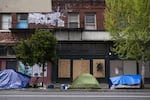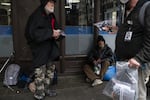Portland police conducted a number of homeless camp cleanups in Old Town and Chinatown on Thursday, after announcing earlier this month they would carry out “high visibility patrols” focused on crime prevention. PPB said the patrols were in response to residents’ perceptions of being unsafe in the neighborhood.
Police Chief Jamie Resch said the patrols aren’t merely to keep downtown clean.
“While it’s not an effort to specifically cleanup camps, it is an effort and an outreach to address criminal behavior,” Resch said in an interview this week with The Portland Business Alliance.
“The emphasis on the camps that we see is the people that are blocking the rights of way,” she said. “To try to work with them to try to get them to move to one side or another, to clean up what they can clean up, to provide services and address any criminal behavior that we may see.”
Related: Metro Discusses Next Steps After Passage Of Homeless Services Measure
Camping downtown has proliferated since the city shut down in response to the coronavirus. As indoor spaces like libraries and coffee shops closed down – which provide critical access to power outlets, wireless internet, and brief but needed respites from the outdoors – and shelters stopped accepting new residents, the number of places where unhoused people could turn for resources dwindled. The few remaining resources were largely concentrated downtown.
In videos of the downtown cleanups posted on Facebook, officers are seen at multiple camps circled in police tape while biohazard cleanup crews remove belongings.
PPB and city officials distinguish between camp cleanups through the city’s Homeless/Urban Camping Impact Reduction Program and what the police bureau calls emergency abatements. Under normal circumstances, PPB will initiate a cleanup only if there is criminal activity such as drug dealing or if a pressing safety issue exists, like a completely obstructed sidewalk. HUCIRP, on the other hand, typically ensures routine safety and compliance.

Tents line a street in front of boarded up shops on April 15, 2020, in downtown Portland. As businesses have closed and resources have moved online or over the phone, mental health treatment has also become more difficult to access for many in the unhoused community.
Jonathan Levinson / OPB
That narrow distinction has further blurred in recent weeks as camps downtown have grown to the point where, the city said, public safety risks have significantly increased. And it’s little solace to people living outside.
“From the perspective of people experiencing it on the streets, if an official entity is taking their stuff it’s a sweep,” said Kaia Sand, executive director of Street Roots, a Portland-based newspaper and nonprofit covering social justice issues. “But if someone else does it, it’s theft.”
City officials significantly reduced campsite cleanups starting in March to allow people to shelter in place, and to prevent inadvertently sparking a coronavirus outbreak in the unhoused population.
In April, the city clarified its policy, saying it would follow guidance issued by the Centers for Disease Control and Prevention. “If individual housing options are not available, allow people who are living unsheltered or in encampments to remain where they are,” the CDC says.
The CDC recommends camp residents have at least 144 square feet of space per individual. "If an encampment is not able to provide sufficient space for each person, allow people to remain where they are but help decompress the encampment by linking those at higher risk for severe illness to individual rooms or safe shelter," the federal guidance says.
Related: Friday Updates: Clark County Applies For Phase 2 Reopening
The city said the only sites it might forcibly move are those posing significant public health and safety risks, such as “those set up in the middle of a street blocking traffic and emergency vehicle access or next to fast-moving traffic such as a highway on/off ramp.”
In one of the recent cleanups, PPB said officers reported human waste, needles, and that the camp was blocking the sidewalk, as well as spilling into the street. That can’t be confirmed from the videos posted online.
“Sweeping a camp and having those people disperse to other places, that's how you potentially spread infections,” said Multnomah County Health Officer Dr. Jennifer Vines, speaking generally about the county policy. “And that's how you potentially bring the virus to new groups and seed new outbreaks.”
PPB said they don’t test for the coronavirus when they disperse campers but residents are offered services.
“We locked everything down, which left people who were already on the street stuck there with no opportunity to go indoors for any services,” said Scott Kerman, executive director of Blanchet House, a nonprofit social services program in downtown Portland that has continued to offer free meals throughout the pandemic.

Mike Dusek, an unhoused person living in Portland, distributes hygiene supplies to other members of the unhoused community on March 28, 2020 in Portland, Oregon.
Jonathan Levinson / OPB
“The people we're serving have really been forced to live pretty depraved lives,” Kerman said. “There's not a lot of hygiene. There's not a lot of sanitation. If you could only imagine what it must be like to have been permanently outside since March 17.”
But now, as Multnomah County starts eyeing reopening downtown business, city officials are hoping to resume homeless camp cleanups in the city as soon as possible. The mayor’s office said they are working with county public health officials, city commissioners and community organizations before resuming cleanups.
An official with Portland’s Homeless/Urban Camping Impact Reduction Program, the office responsible for camp clean ups, said the program has prepared recommendations for the mayor’s office to resume cleanups at unsanctioned camps consisting of 10 or more structures. Those cleanups will be premised on at least one of three criteria: the presence of human waste, large quantities of used drug paraphernalia or verified reports of crime.
On Wednesday, the day before the sweeps downtown, PPB cleared numerous campsites in northeast Portland after Portland Fire & Rescue reported hazardous fires near tents.
“This was a focused abatement of a specific camp where criminal activity was occurring,” PPB spokesperson Lt. Kristina Jones said.
In addition to trash blocking the sidewalk and part of the road, Jones said officers found a number of stolen bikes, a stolen car and signs of drug use.
Jones also said all the individuals in the camps declined the services being offered. In an interview with KATU, one resident said clean up crews took belongings he depended on to survive and that he was planning to move on once the pandemic had passed.
If the city resumes sweeps before all the essential services have reopened, there is concern it will only make matters worse for the unhoused community. It isn’t just libraries and indoor spaces like coffee shops that remain closed. A lot of service providers are closed and might stay that way for a long time.
“A lot of nonprofits just can't do their work,” said Katie O’Brien, executive director at Rose Haven, a day shelter serving women, children and gender-diverse people. “Initially everybody tried to adjust and then some people didn't have continued funding. Some people are very volunteer run and they lost their volunteer corps.”
O’Brien said if Portland wants to find a solution to camps, then the city has to find a way to start housing people. The city has housed people sick with the coronavirus at the Jupiter Hotel, and allowed some camps to be sanctioned during the pandemic. But O’Brien said people need permanent places to go.
“That's the only thing that's going to really pull people out the central downtown area,” O’Brien said.
And while it may not be 100% successful, even getting 20% of the unsheltered population into housing would be a victory, she said.
